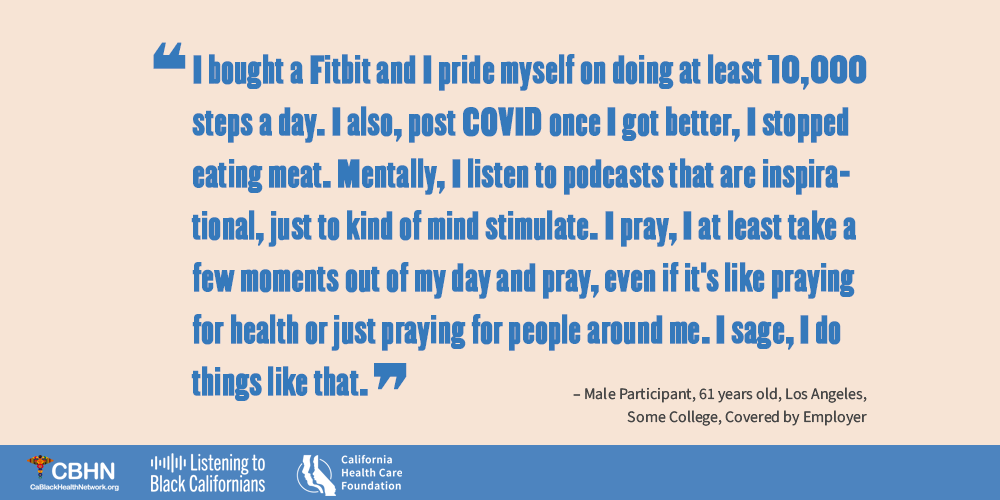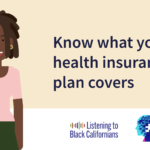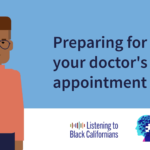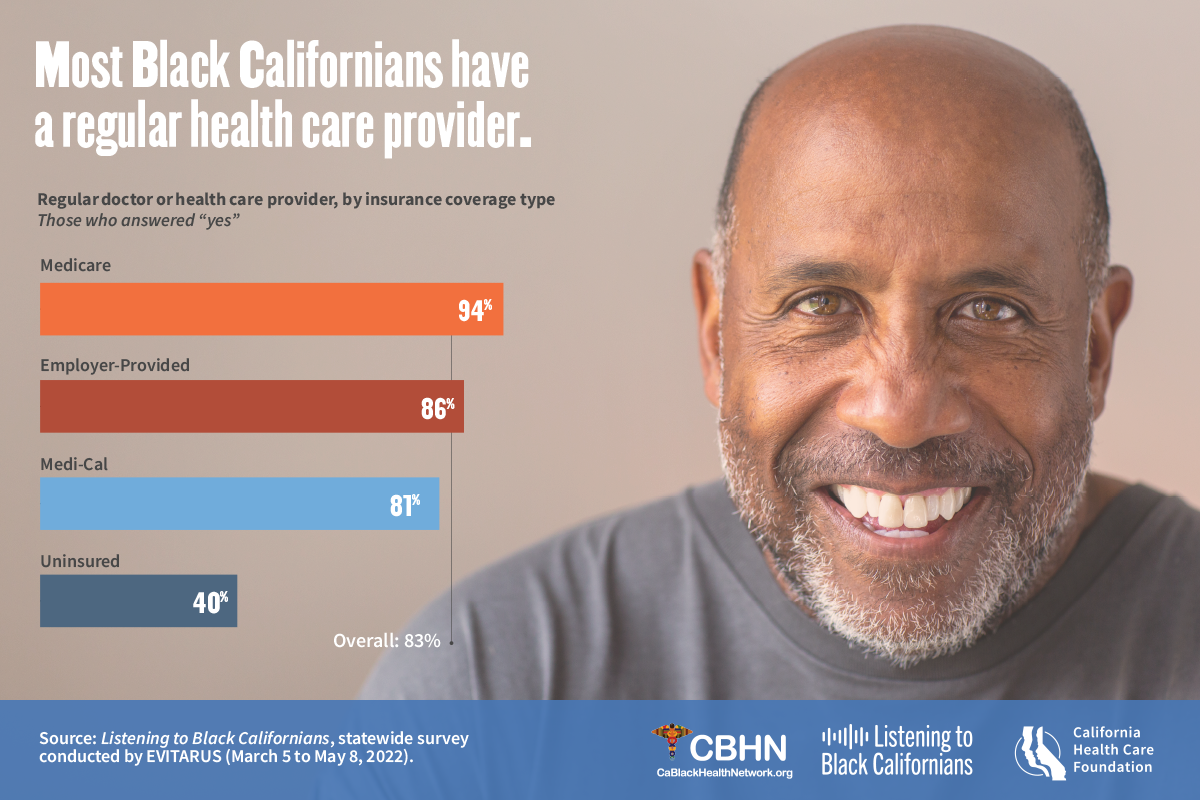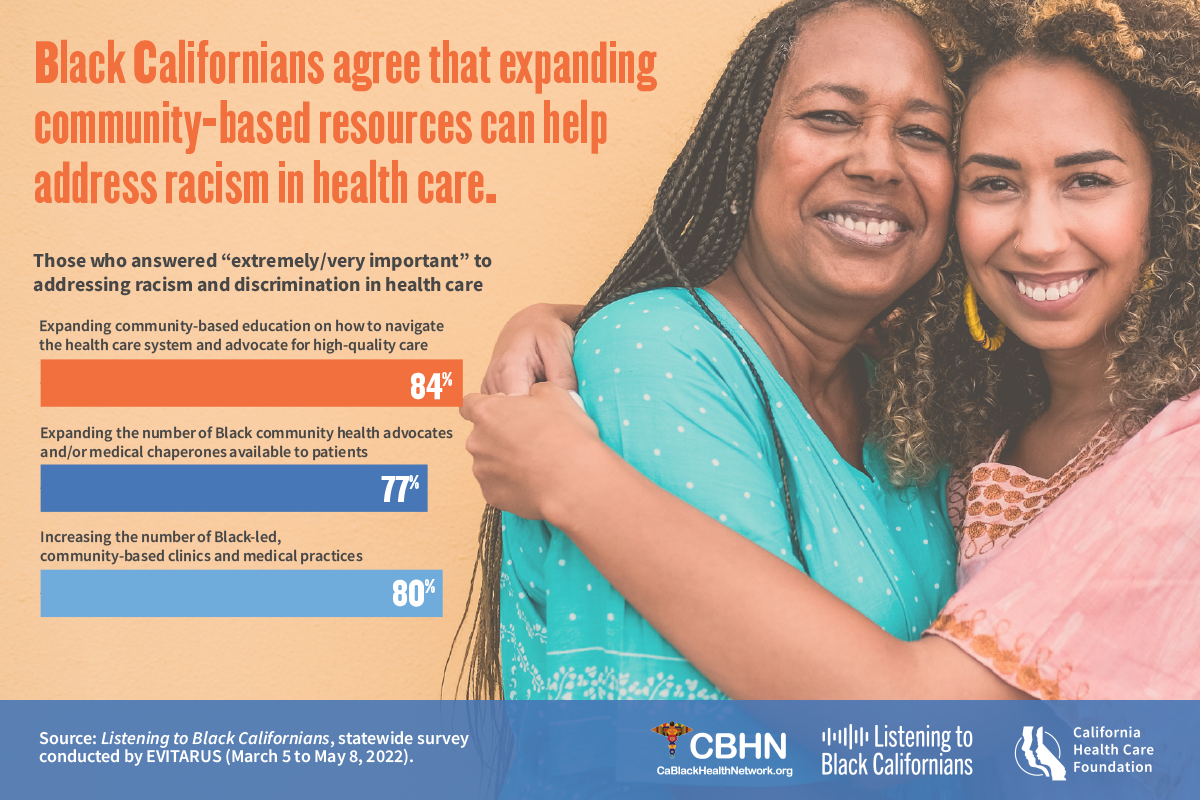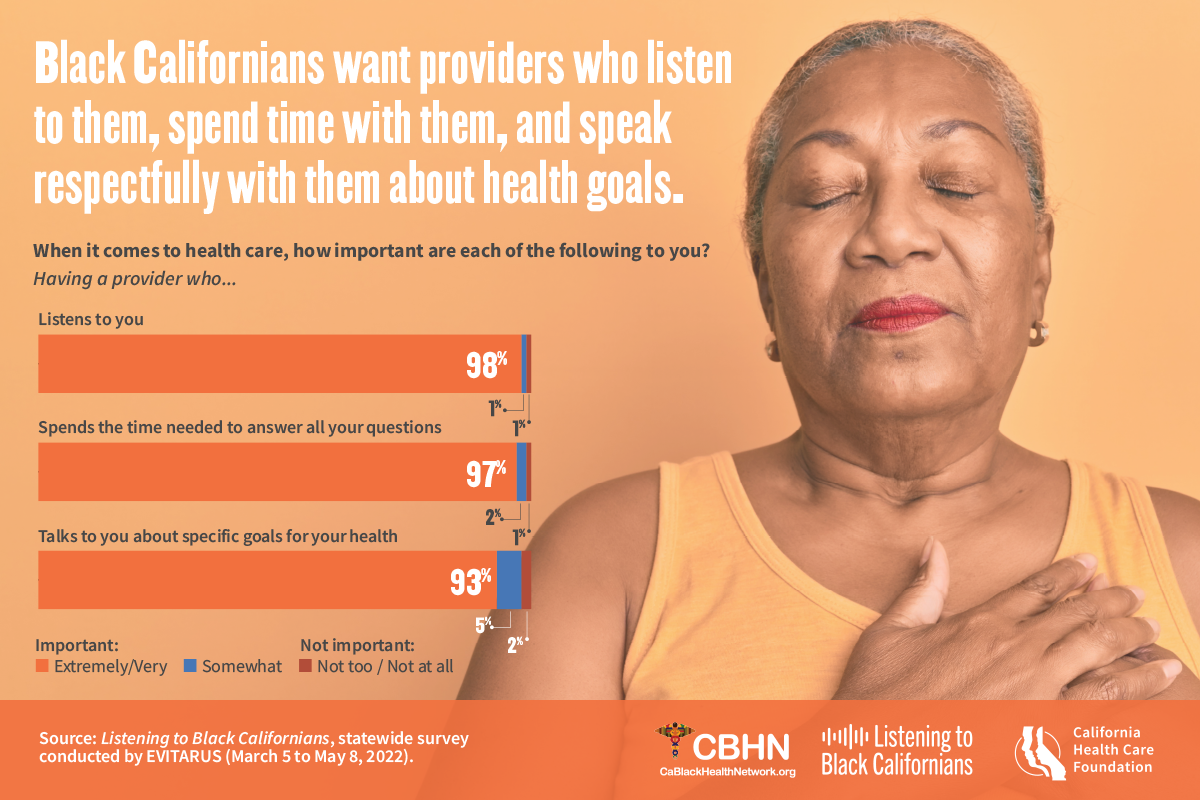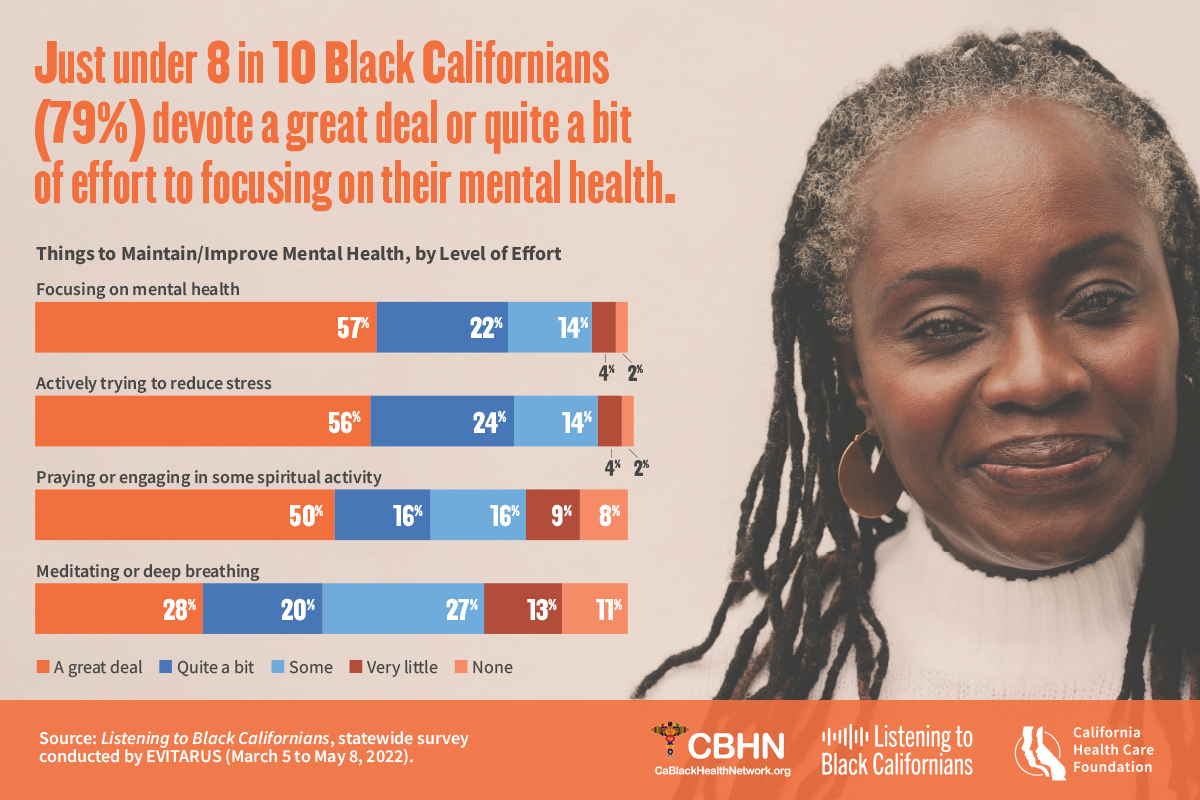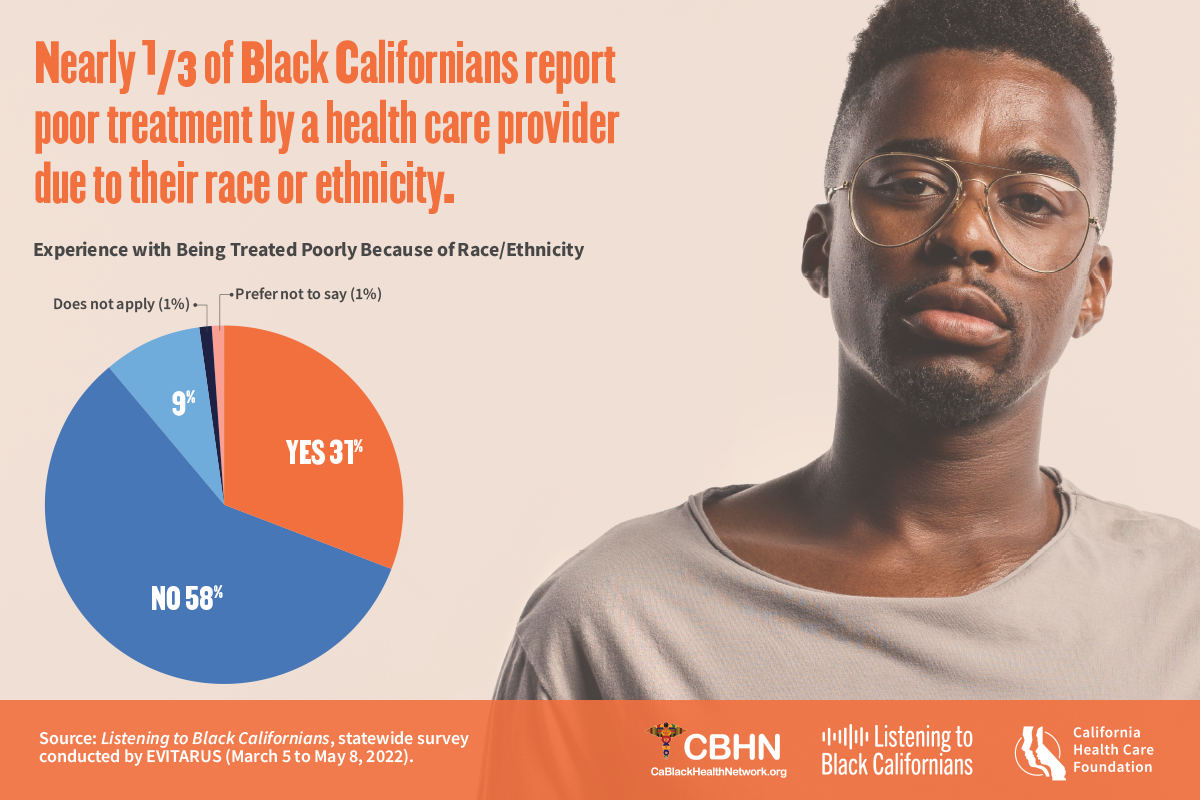The Health 4 Life: Healthy Black People campaign empowers all Black Californians with “HOW DO I…” information and resources needed to navigate the system, advocate for your friends, your family, and yourself, and take action when faced with discrimination.
Keep Scrolling to learn how you and your loved ones can live your healthiest lives and hold the healthcare system accountable for your well-being.

Health 4 Life
HOW DO I...
Get what you need from the healthcare system
“HOW DO I...” Questions and Answers
How Do I Take Action to Protect My Health?
Eat plenty of fruits, vegetables, whole grains, and lean proteins. These nutritious foods can help lower your chance of chronic (long-lasting) diseases such as diabetes, heart disease, and cancer. Try to eat less fast food, salt, and sugar, as these may cause your blood sugar to quickly rise and fall.
Be active for 20-30 minutes a day. Do something you like – a walk, a bike ride, yoga, or even yard work. When you are active, your body and brain make chemicals that help improve your mood and energy.
Aim for 7-8 hours of sleep per night. Go to bed and wake up around the same time each day. Good sleep can help improve your mood and memory. Lack of sleep can lead to weight gain, and even heart disease and diabetes.
Be mindful of unhealthy habits. We all have habits we want to change! Maybe it’s smoking, too much alcohol, or too much TV – the first step is being aware of the habit. Then you can work on it or get help. Unhealthy habits can lead to diseases like cancer and liver disease.
How Can I Prevent Health Problems?
Schedule regular check-ups with a healthcare provider. More than 8 in 10 Black Californians (83%) have a regular healthcare provider. View the section below to get help finding a healthcare provider.
Stay up-to-date on vaccines. Vaccines prevent the spread of diseases such as the flu, measles, hepatitis, and COVID-19. Ask your provider which vaccines you need.
Get preventive screenings. Tests like mammograms and colonoscopies find health problems early, when they are easier to treat. Ask your provider which screenings you need and how often.
If you think something is wrong and want a certain test or screening, ask for it. If your provider says no, don’t be afraid to ask why. If you’re ever unhappy with your provider’s answer, ask them to record it in your file and consider getting a second opinion from a different provider.
If you do choose a different provider, consider telling your provider why you are leaving – they may learn something, which can help them better treat patients in the future.
Care for your mental health. 8 in 10 Black Californians put a lot of focus on their mental health. If you don’t feel good mentally, it can lead to physical health problems. If you ever feel depressed or anxious, speak up and talk to someone. You don’t have to deal with these problems alone!
Care for your spiritual health. More than 2 in 3 Black Californians pray or engage in some form of spiritual activity. Yet, it’s not common to hear providers talk about spiritual health. If faith is important to you, it’s okay to talk to your provider about it. Remember: your provider is your choice. If you don’t think they’re taking your spiritual needs seriously, consider finding a new one. Also, ask your faith leader if they know of a provider who shares similar values.
Note: Healthcare providers can include primary care doctors, nurses, social workers, and more.
How Do I Find the Right Healthcare Provider for Me?
Get recommendations from friends and family. Your relationship with your healthcare provider is important. Ask your family, friends, neighbors, or church community if they like their healthcare provider, then get their contact information.
Search for providers online. Search sites like www.healthgrades.com or www.vitals.com to read reviews for local providers, or visit www.medifind.com to find specialists.
- To find a Black provider, try:
- To find a Black mental health provider, try:
Check for coverage. Make sure your chosen provider is covered under your health insurance. Most plans charge more for a provider that is outside their network. Call your plan or visit their website to check if a provider is in-network.
Check quality. According to the Listening to Black Californians study, about 1 in 3 Black Californians say they’ve been treated poorly by a provider because of their race or ethnicity. Before seeing a new provider, check if other patients had complaints at the Office of the Patient Advocate (OPA) or www.docinfo.org.
After you have a visit with a healthcare provider, ask yourself these questions:
- Was I treated with respect and dignity?
- Did they answer all my questions?
- Did they explain things in a way I understood?
- Did they take my symptoms and my pain seriously?
- Were they calm and understanding? Did they give me enough time?
- Did they consider my beliefs, identity, and culture while discussing my health?
Learn more about a provider. When you find a provider, call their office and ask questions you may have, such as:
- Are you taking new patients?
- Are you part of a group practice where I might see other providers?
- Is there someone who speaks my preferred language?
- How far in advance do I have to make an appointment?
- Do you offer same-day, evening, weekend, or virtual visits?
- Can I get lab work and x-rays done in the office?
- What is your visit cancellation policy? Is there a fee if I miss a visit?
How Do I Get a Second Opinion?
A second opinion is when you choose to see another provider about a diagnosis or treatment.
This is normal and sometimes necessary to get the best care. To get a second opinion, ask your provider for a referral, or ask your insurance plan, clinic, or hospital for a recommendation.
To learn more about getting a second opinion, visit: The Patient Advocate Foundation or WebMD.
How Do I Switch Healthcare Providers if Mine Isn’t a Good Fit?
It is your right to switch providers – especially if you are being treated unfairly or your symptoms are not taken seriously. Here’s how:
- First, find a new provider before leaving your current provider.
- Let your current provider’s office know you’re leaving so they remove you from their system. Consider telling them why so they can improve their services for others in the future.
- Have your medical records sent to your new provider, including lab work, imaging, or other tests.
- Give feedback if your provider didn’t give you proper care. This can hold people responsible and help improve the healthcare system. You can leave a review on sites like www.Healthgrades.com or www.Vitals.com. Or you can file a complaint in California at mbc.ca.gov/Consumers/file-a-complaint.
How Do I Know What My Health Insurance Plan Covers?
Your plan will send your insurance card in the mail. Your card is very important because:
- It proves to healthcare providers that you have insurance.
- It lists the amount you need to pay each time you get different types of health care.
Some plans require your card at visits, while others don’t. But always keep your card with you in case of an emergency.
When you sign up for a health plan, you will get a ‘summary of benefits and coverage’ (SBC). An SBC is a written summary of the health services your plan covers (your benefits) and what you will pay out of your own pocket.
Tip: Store your SBC and other insurance and medical papers together in a safe place.
Every time you get health services, you’ll get a statement from your health plan by mail or email. It shows how much your plan paid for and how much you may owe (if any). These may be called an ‘explanation of benefits’ (EOB), ‘summary notice’ or something else.
Compare your statements to any provider bills you get:
- Make sure you actually got the health services listed and check how much you may owe to the provider.
- When you get a bill, make sure the bill matches the “amount you owe” on your statements.
- Keep your statements for your records.
If you see a mistake, don’t understand your statements, or your plan is not paying for health services you think should be covered, call your health plan. It is your right to speak up when you have questions! When you call:
- Have your list of questions ready.
- Have your insurance card with you.
- Take notes about the call, including the date and name of the person you talk with.
- After the call, put the notes with your other insurance papers.
If your health plan makes a coverage decision that you think is wrong:
- Call them to make sure you understand their decision – you may be able to fix the issue by phone. If needed, politely but firmly ask to speak to a supervisor or manager.
- If they still don’t fix the issue, file an appeal. An appeal is a request you make to your health plan to change its decision about your plan coverage. You should only file an appeal if you think the plan made a mistake – not because you don’t like their decision.
Find instructions for filing appeals on your health plan’s website. The health plan will send you their decision and explain how to ask for a second review if they didn’t change their decision.
Glossary of Insurance Terms
- Deductible: The amount you must pay for healthcare services or prescriptions before your plan starts to pay its portion.
- Co-insurance: The amount you pay as your portion of healthcare services after you meet your deductible. Services may include a doctor’s visit, hospital outpatient visit, or prescription medicine. Co-insurance is usually a percentage of the cost of the healthcare service (for example, 20%).
- Co-pay: The amount you pay as your portion of healthcare services, like a doctor’s visit, hospital outpatient visit, or prescription medicine. A co-pay is usually a set amount, rather than a percentage. For example, you might pay $10 or $20 for a doctor’s visit or prescription medicine.
- Out-of-pocket costs: Healthcare costs you pay yourself, such as deductible, co-pay, and co-insurance.
- Out-of-pocket maximum: A limit that some health plans have on the total amount you have to pay for your medicines and healthcare services in one year. Most plans have an individual or family maximum. After you meet this maximum, the plan pays 100% of covered healthcare costs.
- Premium: The amount you pay, usually every month, for your health insurance. This does not count toward your deductible or out-of-pocket maximum.
How Do I Prepare for My Doctor's Visits?
Health visits can be short, so use these steps to get the most out of them:
- Prepare ahead of time:
- Write down your questions and any symptoms.
- Bring your insurance card.
- Bring a list of all of your medicines.
- Ask someone to go with you to help remember what the provider says.
- During your visit:
- Start with your most important questions in case you run out of time.
- Write down or record your provider’s answers, especially any actions you need to take.
- Check that you understand by repeating information in your own words. You can say:
- “I think what you are saying is… is that right?”
- “I want to make sure I understand… did I get that right?”
- After your visit:
- Follow any health advice or instructions, such as filling a prescription at the pharmacy, getting tests or lab work, or scheduling a follow-up.
- Call your provider if:
- You have any side effects from medicines
- Your symptoms get worse
- You haven’t gotten test results (Don’t assume no news is good news!)
- You don’t understand your test results or how to take a medicine
What Questions Should I Ask My Healthcare Provider?
Here are some questions that may be appropriate to ask your healthcare provider:
- What are my main health problems?
- Do I need to change my daily routine?
- What tests do I need?
- How long will the test take?
- How much does the test cost?
- Why do I need to take this test?
- When can I expect my test results and how do I get them?
- What will we know after we get the test results?
- What procedures do I need?
- How long will the procedure take?
- How much does it cost?
- What procedure is most common for my health condition?
- What side effects should I expect?
- What will happen if I don’t get the procedure?
- When do I need to have this procedure?
- Can I still work if I get this procedure?
- What are my treatment options, and how will they help me?
- How should I take my medications?
- How often should I take it?
- How much (dose) do I take?
- At what time of day should I take it?
- Do I take it before, with, or between meals?
- Can you tell me more about my medications, such as:
- Why am I taking this medication?
- What’s the name of the condition this medicine is treating?
- Are there any side effects I should know about?
- Is there a cheaper, generic form of the medicine?
- Will the medicine conflict with other medicines I take?
- How should I store the medicine? Does it need to be refrigerated?
How To Advocate For Yourself And Your Loved Ones
Clearly communicate with your providers.
Healthcare providers can include primary care doctors, nurses, social workers, and more.
Some Black patients say they minimize their symptoms and questions to avoid being seen as difficult at their visits. As patients, it can be hard to speak up. But if we don’t, we don’t get the care we need and deserve.
Here are some ways to communicate clearly with your provider:
Prepare for your visit:
- Speak up:
- Be assertive but respectful – if you ever feel your provider is dismissing important issues, use “I” statements. For example, say “I disagree” instead of “You’re wrong.”
- Don’t minimize your symptoms or situation – if something feels important, it is.
- Do your own health research before and after a visit: Read about your symptoms, treatment options, or tests online from trusted sources such as mayoclinic.org or medlineplus.gov. This can help you have an informed discussion around your questions and the terms your provider may use.
Know your rights as a patient.
Everyone, regardless of race, ethnicity, or other characteristics, has rights as a patient that are protected by law. Your rights include being able to:
- Get a second opinion about a diagnosis or treatment from another provider.
- File a complaint. If you feel mistreated or disrespected, chances are you’re not alone. It’s up to all of us to hold our providers accountable. Filing a complaint helps establish a record of misconduct.
- Choose your own provider. A good provider treats you with respect, doesn’t rush you, and makes eye contact. It’s your choice to switch providers when it’s not a good fit.
- Access your medical records. Did you know you can add your own notes to your medical records? You have the power to set the record straight. If your provider denies a test or treatment that you asked for, make sure that goes in your record. It’s your health and your medical record—remember that.
- Keep your medical information private. Your medical information is just that—yours. You can set limits on who sees your information, and on when and how your providers contact you.
See a full list of your rights in California here.
File a complaint if something goes wrong.
Some Black Californians say their privacy was not respected or they were harmed during a health care visit. If this ever happens, it’s your right to file a complaint. Providers need to be held accountable for their actions. Sharing your complaints can prevent this in the future.
You can file a complaint with your state’s medical board if your provider has:
- Failed to give you proper care
- Failed to diagnose you with a medical problem that is found later
- Prescribed you the wrong medicines
- Acted in an unprofessional way
In California, you can file a complaint about a provider at www.mbc.ca.gov/Consumers/file-a-complaint.
If your health plan denies, changes, or delays coverage for medical services that you think should be covered, you can:
- File a complaint with your health plan first. Learn how to file a complaint at www.dmhc.ca.gov/File-a-Complaint/Contact-Your-Health-Plan.aspx
- Then you can apply for an Independent Medical Review (IMR). An IMR is when a medical professional reviews a decision of your health insurance company. The Department of Managed Health Care Help Center can help with an IMR at www.dmhc.ca.gov/FileaComplaint.aspx
Talk to a patient advocate.
Patient advocates, also called patient navigators or liaisons, are people who can help you use the healthcare system. They can help you:
- Set up appointments and talk with your providers
- Understand provider instructions and test results
- Understand your health plan
- Get financial help
- File complaints about your care and more
There are different types of patient advocates:
- Advocates hired by hospitals, health care facilities, or insurance companies to help patients within that facility or company – this is usually free.
- Private advocates with their own businesses who offer one-on-one help to patients at different facilities – this is usually not covered by insurance, and costs money.
To get help from a patient advocate:
- In a hospital or health care facility, ask patient services if they have advocates that can help you while you are there.
- Ask your health plan if they can offer a case manager to help you with insurance issues.
- Visit these sites to help you look for a private advocate:
- The National Association of Healthcare Advocacy (NAHAC) directory at nahac.com/directory-of-advocates#!directory
- The AdvoConnection directory at profile.advoconnection.com
- The Patient Advocate Foundation offers free support to patients and families living with a serious or chronic health condition. Visit them at www.patientadvocate.org
Where Can I Get Additional Information?
- California’s Patient Bill of Rights Summary
- Cancer Patient Bill of Rights
- Black Birthing Bill of Rights
- CDC: How you can prevent chronic diseases
- California Black Women’s Project: Healing for the mind, body & soul
- African American Wellness Project Mental Health Resources
- Dial 988 for a crisis and suicide lifeline
Health Literacy Toolkit
Click here to download the CBHN Health Literacy Toolkit.
You Spoke, We Listened!
Listening to Black Californians Study Overview & Findings
Black Californians are pursuing good health and healthcare and want the health system to do its part.
That is what the California Health Care Foundation (CHCF)’s study revealed after listening to Black Californians’ experiences with racism and healthcare.
As one of the largest studies focused on the healthcare experiences of Black Californians to date, the study included a survey of 3,325 Black Californian adults, in-depth interviews with 100 Black Californians, and 18 statewide focus groups.
The resulting report, Listening to Black Californians: How the Health Care System Undermines Their Pursuit of Good Health, concluded:
- Black Californians…
- Have health insurance
- Get preventive screenings
- Prepare for visits to the doctor
- Monitor their physical health
- And want the healthcare system to meet them halfway

